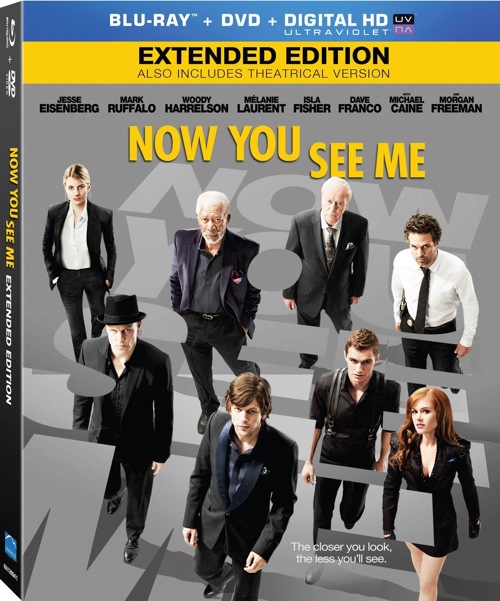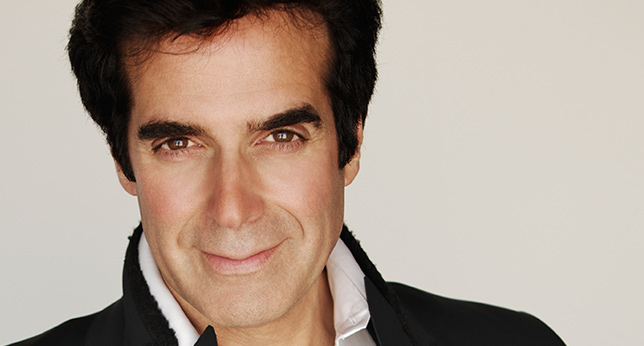
When director Louis Leterrier and company began work on NOW YOU SEE ME, they knew straight away that they wanted David Copperfield as their technical consultant. Not only is the legendary magician still the most popular performer in his profession (his latest Vegas show, AN INTIMATE EVENING OF GRAND ILLUSION, has been cleaning up at the MGM Grand since 2003), one of his most ambitious tricks, "The Portal", was the direct inspiration for Edward Ricourt's original screenplay. Fortunately for the filmmakers, Copperfield is an avid cinephile, citing directors from George Méliès all the way to Christopher Nolan as significant influences on his work; ergo, he was all too happy to lend his expertise to this summer's surprise hit.
It's impossible to overstate Copperfield's impact on magic. Guinness has certified him as the highest grossing solo entertainer of all time (raking in over $4 billion in worldwide ticket sales), while his TV specials have been a constant since the late 1970s. His stunts may be outlandish, but he's such a terrific showman that he actually makes you believe you've just seen him walk through the Great Wall of China or made the Statue of Liberty disappear. Copperfield is a master of spectacle, which makes you wonder why he hasn't made big studio movies of his own.
We may not be wondering much longer. When I interviewed Copperfield last week for the Blu-ray/DVD release of NOW YOU SEE ME, he intimated that he has several big-screen projects in development. This is all very intriguing, but there's nothing better than seeing the real illusion in person: no cuts, no CG, just your eyes versus a brilliant trickster's sleight of hand. The stage is where the great magicians thrive, and it's cool to see Copperfield continuing to dominate and innovate in this medium.

Mr. Beaks: This has been a busy year for you movie-wise. Is collaborating and advising on films something that you seek out?
David Copperfield: It works both ways. The filmmakers know that the inspiration for my shows throughout my entire life came from great films. Before storytellers took it over, cinema was a magic effect; it was a technology that magicians used to amaze people. Then it became commonplace, and we couldn't use it anymore in our shows. So my presence in that world is a natural one. The cinema was really reinvented by magicians - George Méliès and people like that - at the beginning of the cinema. The second reason is [cinema] influenced me so much in my storytelling style of magic. So they find me. In the case of NOW YOU SEE ME, the filmmakers and writers came to see my show, we went to my studio and watched tapes of all my specials... you know, doing magic onscreen is something I did for thirty years on TV. Trying to make magic credible and believable by how you shoot it, what angles you shoot it with, how long you let a shot last, how the camera moves to make the home viewer feel like they're part of the magic. I had to make that happen on TV for many, many years, and they took a lot of inspiration from that.
Beaks: In terms of the writing, would they send you drafts of the script? Would they ask "Is this plausible? Is this correct?"
Copperfield: Louis Leterrier at the very beginning did the movie for me. He literally performed the movie over the phone. (Laughs) He went scene by scene. He almost, in movie terms, did a pre-vis version of the movie for me, just to give me an idea of how the movie flowed and the story flowed. It's not just about the tricks for me. It's never been about just tricks or magic; it's about the magic being really integrated into the story to make it make sense. That's true of my magic in my show, and also true about a film that has to take an audience on a journey. But he actually performed the movie for me, which was really awesome. For the director to do the whole film by memory, scene by scene. I went away, took that knowledge and my notes, and I got my team - I've got a whole bunch of people that I work with - and redid it for them. We had many kind of charrettes or sessions that we did, and came back to them with a whole bunch of ideas of what they could do magically to expand what they were doing storywise. We did a Skype call with the film team in the room and the magic team in the room, which was great. Then they went away and did their thing. Towards the end of production, [Alex] Kurtzman called me up, which was extremely flattering, and asked me about story points and how they could make this magically work and make the story happen. The entree into this whole world is because of the magic, but at the end of the day it's really about making the story flow seamlessly with the effects so they don't seem tacked on.
Just so you know, this whole thing started when Ed Ricourt, who wrote the original draft of the movie, came to my show and saw me do a piece that really took magic in a new direction. I'm always trying to take magic to where it hasn't gone before, because why do it if you're going to do the same thing everybody else has done? It was an effect in the show where I transported myself and an audience member to a beach somewhere out of the country and made it credible - and made people cry, the emotional effect of that, by having this effect where over the heads of the audience someone is vanishing and reappearing someplace else. Apparently, as [Ricourt] said to me, the fact that that was really being done on stage gave him the license to write this story where this is the makings of a heist movie. It's not just rabbit-out-of-a-hat magic; it's really transcontinental magic that we developed. It came from an illusion in my show that people said would never work, and now it's the hit movie of the summer. (Laughs)
Beaks: When it comes to filming an illusion, and getting the audience to buy it when they're not witnessing it in person, what have you found is the most effective approach? I would think that a single take would be best, because when there's a cut people tend to think "Oh, what did I miss? What did they just do?"
Copperfield: That's a tough decision for a filmmaker to make. It's way more exciting to see close-ups and reactions and cuts, but that does sacrifice a bit of the magic's credibility. But the story comes first, and if the feeling is right, and the audience goes for it, then I think you've done your job. If it was me doing my TV special, obviously I would have no cuts. I would have long steadicam shots to get as much credibility [as possible]. But in this movie, they did a lot of... long takes to make the audience feel like they're seeing around and behind. Stylistically, it's something that we kind of pioneered.
Beaks: Who do you feel are the most magical filmmakers, filmmakers whose films have the most magical quality?
Copperfield: Going back to the beginning, I was a big fan of Frank Capra and Victor Fleming and Orson Welles - who was a magician and was really passionate about magic. A lot of the things he did camera-wise and filmmaking-wise towards the beginning of his life were influenced by his passion for magic. So Orson Welles, Walt Disney... real masters of the art that I get a lot of inspiration from. There are many, many more. Today, Christopher Nolan... what he does is amazing. Sam Mendes is amazing. And I think Louis [Leterrier] did an excellent job; it's a very hard combination of making the story work and the magic work.
Beaks: When you say you're trying to find something new in order to surprise audiences, what do you think it is that audiences are looking for?
Copperfield: I think it's neat to dream. I think it's neat to be transported. That's why movies work as an art form. Magic really goes out in 3D. I can make an audience really respond because they're seeing something in 3D; there's something special about it that has them emotionally involved in the experience of seeing it in three dimensions. I think we keep trying to change the art, and trying to do magic differently. If you come to see my show at the MGM, you'll see magic done quite differently than what you've seen in the past. You try and reinvent the form. It's been good. Movies challenge me. All the stuff that's being done on the screen and all the CG effects force me to up my game, and we're doing it. It's working.
Beaks: Have you ever thought about making a big studio film?
Copperfield: We're working on it. Lots of stuff is going on. We're developing scripts, we're collaborating with lots of people, and there are a lot of stories in my museum. It's an incredible resource. There are amazing stories that have been untapped.
Beaks: You mentioned Orson Welles, who was so passionate about magic. I'm sure you've seen his act on film, but did you ever get to meet him personally, and what did you think about his talent as a magician?
Copperfield: Orson Welles hosted my first TV special, so imagine that. I got to hang out with him. I have films of him performing magic, I actually performed magic with him... this was towards the end of his life. He was an interesting character. At that moment, he wanted to trade places. To be a famous magician would've been his dream, and to be a famous filmmaker would've been my dream. It was a really interesting mix. He was a fascinating guy. He did his career in reverse basically. He did his best work in the beginning and was so prolific, so motivated and so focused. But he loved magic, and loved doing magic, performing it in the classic sense. We talked a lot about it. I still draw a lot of inspiration from his life.
Beaks: Are you going to be involved in NOW YOU SEE ME 2?
Copperfield: I am. We'll take it one step at a time, but yes.
Beaks: How do you surprise audiences this time?
Copperfield: There are many, many ways. We have a lot of things up our sleeves.
Beaks: Is there one particular illusion you tried to pull off that you just couldn't nail for one reason or another?
Copperfield: Yes. Be a great singer. It would be much easier. I wouldn't have to mess around with these illusions or technology. I could just sing.
NOW YOU SEE ME is currently available on Blu-ray/DVD.
Faithfully submitted,
Mr. Beaks
